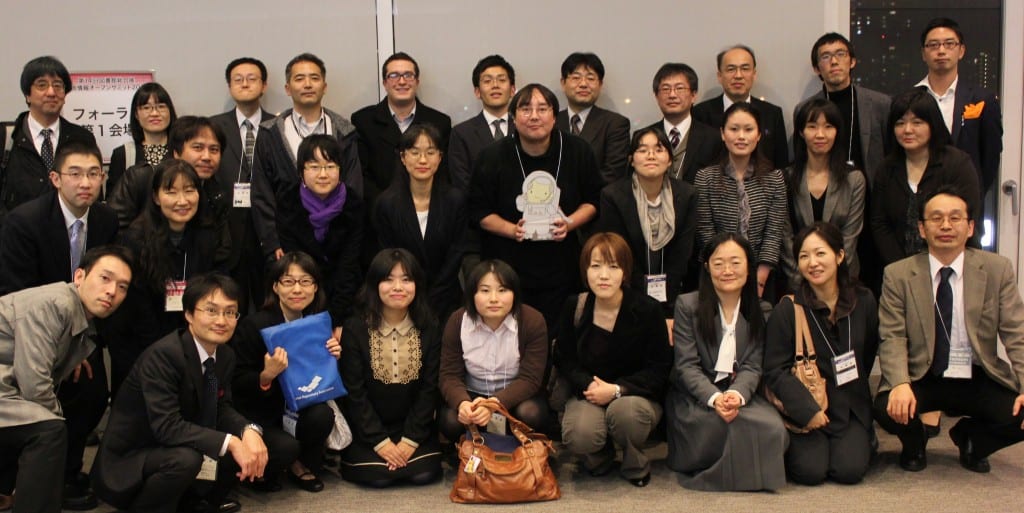It was a great privilege and an honour to be invited to participate in the DRF9 conference, which took place at the Pacifico conference centre in Yokohama, Japan on Wednesday November 21st 2012.
I had been invited attend to give presentations in two different capacities – firstly in my capacity as External Liaison Officer for UKCoRR (United Kingdom Council of Research Repositories). Secondly, the DRF (Digital Repository Federation) was interested in my practical experiences of working as a Repository Manager in a British university.
The day before the formal DRF9 conference, I met with several members of the DRF committee to run through presentations and to carry out the final preparations for the next day’s meeting. I very much enjoyed learning about what Japanese repository managers have been doing in the way of promotional activities for their repositories. I was particularly impressed by many of the repository-branded marketing and promotional items I was shown, including umbrellas, drinks holders and stationery. This is one area where British repository managers could learn from their Japanese counterparts and I will be taking some examples of theses materials back to the UK to show my British colleagues! After this meeting I was (very generously) treated to dinner by many DRF committee members at an excellent restaurant specialising in seafood.
On the day of the DRF9 meeting, the audience were briefed on the Finch Report, about which there has been much interest in Japan over the last couple of months. I was asked to present UKCoRR’s response to the Finch Report and then to take part in a discussion about models in open access with Prof. Syun Tutiya, of the National Institution for Academic Degrees and University Evaluation.
In this part of the session I explained that the reaction to the Finch Report had been mixed, amongst the UK repository community. Although we welcomed the fundamental support for open access, there was concern about the high costs of moving to ‘gold’ open access in the short term, as well as the possibility of ‘double dipping’, (whereby universities pay open access article processing charges – APCs – as we well as having to cover subscription costs). Another concern was the international context, as UK universities would still have to pay subscriptions to access content written abroad. The discussion with Professor Tutiya was very interesting, although because of the healthy discussion, the session did over-run for a good 15 minutes!
In the next part of the session I was asked to present on some best practice relating to the open access advocacy activities undertaken by repository managers in the UK. I explained that over recent years, a number of different approaches have been tried, but the general feeling is that scheduled meetings with individual academics tend to have the most successful outcomes for repository managers. There are a number of reasons for this. Firstly, these meetings allow you to build relationships with academics and understand their motivations and priorities. Secondly, you create an environment whereby academics are more comfortable asking questions and raising objections. Repository managers have to be able to elicit objections in order to be able to handle them using evidence and opinion.
From my point of view, it was very interesting to see that the list of common objections prepared by the UK’s Repositories Support Project (RSP) was very familiar to the Japanese repository managers. It seemed very obvious that both UK and Japanese repository managers deal with precisely the same problems on a daily basis, and that we could do a lot to help each other by working in partnership. To this end, UKCoRR would like to do more to build on its special relationship with DRF over the next year, to see what partnerships and exchanges of knowledge can be developed to support repository managers in both countries.
The final session of the day provided progress reports and discussion on a number of consortial repositories in Japan, and I was asked to provide a brief overview of the situation in the UK. This strikes me as another approach where the UK could learn from the Japanese culture of shared services, and I expect that the lure of potential savings of cost and effort may see more consortial repositories in the UK in the future.
Discussions about building international relations and sharing expertise continued over drinks and dinner where all the attendees participated in a fun quiz testing knowledge on a range of subjects ranging from open access to Japanese football players in the UK premier league (Shinji Kagawa). It was great to be a part of this dinner and I was particularly impressed by the way in which Japanese colleagues work (and play) together – I suppose, much like we do in theUK.
I will always have very fond memories of my first trip to Japan and the warmth with I was welcomed. I am very much looking forward to developing relationships further between UKCoRR and the DRF, and for the moment, all that remains is for me to thank the DRF for their superb hospitality.
Dominic Tate
UKCoRR External Liaison Officer
